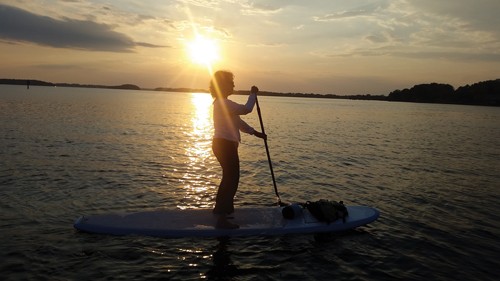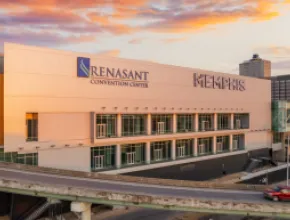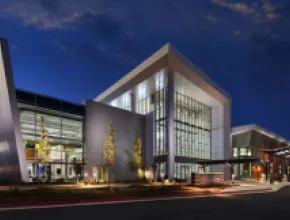Producing legends from John Coltrane and Thelonious Monk to James Taylor and Roberta Flack—plus several American Idol and The Voice contenders and finalists—the North Carolina music scene contributes significantly to the state’s creative economy and cultural tourism industry.
Deeply rooted in finger-picking, toe-tapping tradition, there’s a genre for every taste. From Appalachian folk music and gospel to jazz and rock, the scene runs the gamut, with venues and stages, many nationally renowned, to match. Scholars and fans alike can pursue the state’s African American Music Trails and Blue Ridge Music Trails, two signature projects of the pioneering North Carolina Arts Council, celebrating its 50th anniversary this year. And for groups looking to “record” lasting memories, North Carolina has the setlist or soundtrack for any agenda or event.
Triangle Tunes
Offering five walkable entertainment districts, 80-plus performance venues and a genre-spanning scene that goes from bluegrass to reggae, Raleigh, the state capital, is also a seat of live music. In fact, it has “The Most Music” in North Carolina, marketed via an ongoing collaboration between the Greater Raleigh CVB and Wake County music venues, festivals, promoters and other stakeholders. As the partnership proclaims, Raleigh offers “the most dates, the most venues, the most bands, the most genres—the most any music maniac could hope to find.”
Headline venues include the Duke Energy Center for the Performing Arts and Red Hat Amphitheater, both steps from the Raleigh Convention Center.
Six professional companies call the former home, including the North Carolina Opera, Carolina Ballet and North Carolina Symphony. Versatile rentals at the Duke Energy Center include the Memorial Auditorium. Home of Broadway Series South and the North Carolina Theatre, this crown jewel, from 1932, has hosted luminaries from Sinatra to Prince. The Center is also home to PineCone, the state’s largest traditional music organization.
Hosting major events like last month’s PineCone-supported Wide Open Bluegrass, which it touts as the world’s largest urban bluegrass festival, the 5,990-capacity Red Hat Amphitheater offers flexible rental space for groups.
Other rentable Raleigh venues include the celebrated Lincoln Theatre, historic Cary Theater and Pour House Music Hall in downtown’s Moore Square Art District.
Opened in 2008, the 2,700-seat Durham Performing Arts Center (DPAC) is approaching its 10th anniversary as one of the nation’s hottest live entertainment venues. Attracting 400,000-plus guests to some 200 shows each season, DPAC offers flexible rentals including full theater buyouts or a reduced 2,000-seat configuration.
DPAC is one of 43 group-capable venues on the million-square-foot American Tobacco Historic District campus. Featuring popular shows such as Back Porch Music on the Lawn, the 2,200-capacity Amphitheater is among nine outdoor options on the campus.
Reviving a mid-century car dealership in downtown’s Central Park District, Motorco Music Hall features a 450-capacity Showroom, Garage Bar and large patio. Group options include outdoor tented events, with catering from the venue’s Parts & Labor kitchen.
Fans of the blues, bluegrass, barbecue and more have a smokin’ home at Durham’s family-owned Blue Note Grill, private event space included.
Opened in 1969, Chapel Hill’s Cat’s Cradle is a national live-music shrine, attracting headliners from Joan Baez to Nirvana. Moved to downtown Carrboro in 1993, the 750-capacity venue offers the 160-capacity Back Room for events. Other local temples include the all-ages rock club Local 506. The University of North Carolina at Chapel Hill, meanwhile, presents more than 200 public concerts annually in venues including the Kenan Music Building and Memorial Hall.
PageBreakTuned-Up Triad
North Carolina’s heartland was rock festival central in the early 1970s. Likened to Woodstock by one Greensboro reporter, the 1970 Love Valley Rock Festival featured the Allman Brothers Band and other acts. In 1972, Alice Cooper and Fleetwood Mac rocked some 100,000 revelers at the Peachtree Festival, held at the Rockingham Speedway. Santana headlined Peachtree 2, held in Fayetteville in 1973.
Today, the Triad remains in the groove with the Carolina Blues Festival. Staged annually in Greensboro since its inception in 1987, it’s the Southeast’s longest running blues festival.
More tenured still is Greensboro’s celebrated Carolina Theatre. Once “The Showplace of the Carolinas,” this 1927 vaudevillian heirloom, resurrected in 1977, presents concerts and events year-round. Rental options include the 1,200-seat auditorium, stage and lobby, second-floor Renaissance Room and third-floor Crown at the Carolina.
Hosting 1,100-plus events each year, the versatile Greensboro Coliseum Complex features the 22,000-seat multipurpose Greensboro Coliseum, 7,061-capacity outdoor White Oak Amphitheatre and 300-seat Odeon Theatre.
Opened in 2014, the Cone Denim Entertainment Center is the update of the early 1900s Imperial Theater, featuring live music and offering versatile rental space.
In Winston-Salem, the City of Arts and Innovation, the event-capable Stevens Center is another restored gem. Originally a 1929 silent movie palace, the 1,364-seat venue reopened in 1983 as the primary performance space for the University of North Carolina School of the Arts, as well as the Winston-Salem Symphony, Piedmont Opera and other local and state arts organizations. Named for a heroic local Vietnam War veteran, Wake Forest University’s Lawrence Joel Veterans Memorial Coliseum offers arena and meeting room rentals.
High Point, childhood home of jazz icon John Coltrane, celebrates the two-day John Coltrane International Jazz and Blues Festival each September.
Charlotte Chords
Along with the roar of NASCAR engines, the Queen City region has a rocking ’70s legacy of its own. The Stones, Stevie Wonder, The Who and Elvis all played the Charlotte Coliseum (since demolished, and succeeded by today’s group-capable, 8,600-seat Bojangles Coliseum), while 1974’s unbridled August Jam attracted 200,000 fans to the Charlotte Motor Speedway.
Today, concert magnets include the AvidXchange Music Factory. Formerly the N.C. Music Factory, this entertainment and dining update of a former textile mill features the 5,000-seat outdoor Charlotte Metro Credit Union Amphitheatre and indoor 2,000-capacity Fillmore, inspired by the 1960s San Francisco icon. Other Charlotte hot spots include the Levine Center for the Arts, Duke Energy Theater, Owens Auditorium and other venues operated by Blumenthal Performing Arts.
In neighboring Cabarrus County, the North Carolina Music Hall of Fame enshrines greats including Coltrane, Charlie Daniels and Roberta Flack.
Mountain Melodies
Asheville, population 89,000, boasts the most breweries (26, with some 60 region-wide) per capita in the nation, including the East Coast operations of Sierra Nevada and New Belgium Brewing.
Western North Carolina’s ever-evolving largest city, scenically seated in the Blue Ridge Mountains, is also fast gaining a national reputation for live music. For groups, it’s a perfect pairing of suds and sounds. Experiences range from tours of electronic music pioneer Robert Moog’s legendary Moog Factory to LaZoom’s Band & Beer Bus Tour, which matches local musicians with stops at three local breweries.
Classic venues include the Orange Peel Social Aid and Pleasure Club. Acclaimed by Rolling Stone as one of the “Top Five Rock Clubs in the Country,” Orange Peel welcomes 100 to 250 guests for seated affairs or plated dinners, and smaller groups in its lower level private club, PULP. Other group-capable stars include the Grey Eagle Music Hall and Pub; versatile Asheville Music Hall; and Isis Restaurant & Music Hall, housed in an updated movie theater.
About 40 miles southeast of Asheville is the preeminent Brevard Music Center Summer Institute and Festival. Founded in 1936, this group-capable treasure, set on 180 acres in the Blue Ridge Mountains, stages 80-plus concerts each summer. Venues include the 1,800-seat Whittington-Pfohl Auditorium, stage for big-time acts like Lyle Lovett and his Large Band.
Coastal Tones
Along with the rhythms of its river—and seaside-location—Wilmington calls groups with a melody of musical venues and events.
“Wilmington’s vibrant music scene includes a mix of local and regional talent as well as national touring acts in a variety of genres, from beach music and reggae to jazz, bluegrass, country, rock and blues,” said John Sneed, vice president of sales and services for the Wilmington and Beaches CVB.
“Weekly summer concerts are held on Wilmington’s award-winning Riverwalk, on the lawn at Bellamy Mansion, under ancient live oaks at Airlie Gardens, on the iconic Carolina Beach Boardwalk and at ocean piers,” Sneed continued. “The good news for meeting planners is that live music happens year-round. These include big-name performances at historic Thalian Hall Center for the Performing Arts, and newer convention district venues such as the state-of-the-art 1,500-seat Wilson Center, and The Shell at Port City Marina.”
With its own scenic riverfront location, New Bern, North Carolina’s historic first capital, celebrates the 37th edition this month of MumFest, its annual two-day celebration featuring music, dancing, food and more. Local performance venues with rental options include the 300-seat Civic Theatre and historic Bank of the Arts building.
On Roanoke Island in the Outer Banks, the historic Waterside Theatre in Manteo is renowned for the “grandfather” of all outdoor live productions, The Lost Colony. Produced by the Roanoke Island Historical Association since 1937, the tale of the 117 16th century English settlers who landed here and then mysteriously disappeared is widely acknowledged as the precursor to the modern American Broadway musical.







